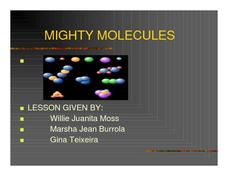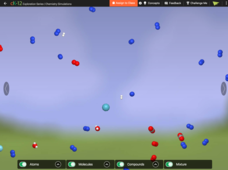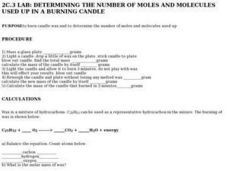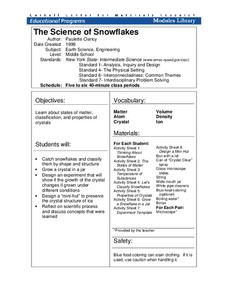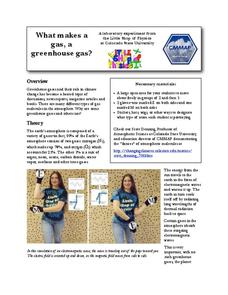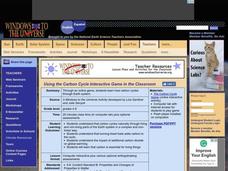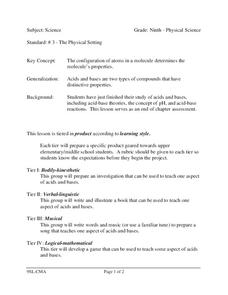Cornell University
What Happens When We Excite Atoms and Molecules?
Excited atoms lead to exciting lessons! Learners use heat and light to excite both atoms and molecules. They display their learning in the form of Bohr models depicting the excited state of the atoms.
Curated OER
Atoms and Elements: An Introduction
Learners are able to discuss the difference between a proton, a neutron and an electron. They also can explain the difference between an ionic and a covalent bond. Students know the main structure of atoms and molecules. Student are able...
Curated OER
Chemical Formulas for Molecules
Newcomers to chemistry compare hydrogen peroxide to water, realizing that the difference of one oxygen atom significantly affects the chemical properties. Other pairs of compounds and their formulas are also examined. A few chemical...
Curated OER
Mighty Molecules
Learners examine a PowerPoint production on molecules. Then they construct their own molecule and define what an atom, molecule, and matter is. They make a H2, HCI, and an H2O molecule. Finally, a drawing to accompany the actual model is...
CK-12 Foundation
Air Matters
What makes up the air we breathe? Young scientists explore the atoms and molecules in the air. An interactive lesson allows individuals to watch the movement of the particles in the air and change the makeup from a mixture to a...
Space Awareness
Let's Break the Particles
Build learning by breaking atoms! Young scientists study the way energy changes with a hands-on activity. As they roll steel marbles down a ramp, learners test the hypothesis that kinetic energy does not go away with friction...
Curated OER
Lab: Determining the Number of Moles and Molecules Used Up In a Burning Candle
Young scholars find moles and molecules used when a candle burns. In this moles and molecules lesson plan, students calculate the initial mass of a candle and the mass of a candle after it burns for 3 minutes. They calculate the mass...
Cornell University
The Making of Macromolecules
Compare and contrast macromolecules made from the same elements. Young scholars learn how the structure of a molecule has as much influence on a compound as the elements in the molecule. They experiment with molecular model kits to...
Cornell University
The Science of Snowflakes
Who can grow the best crystals? Challenge class members to develop strategies for enhancing growth in the crystals. Through a lab investigation, learners study the properties of crystals and test the effectiveness of different...
Curated OER
Activity #5 Environmental Effects
Young scholars explain the implications of particle theory of The Law of Conservation of Matter for problems of pollution and waste disposal. They describe, in terms of atoms and molecules, what happens to materials when they are...
Colorado State University
What Makes a Gas, a Greenhouse Gas?—The Carbon Dioxide Dance
Investigate a heated topic in environmental science. Scholars team up to play the parts of gas molecules in the atmosphere. As the teacher moves about, acting as the electromagnetic wave, learners react as their molecules would to the...
Science-Class.net
Rock Candy Crystals
Candy is one of my favorite words, and it's an even better word when it relates to science. Yes, candy science can happen when you grow rock candy crystals with your class. The entire process for growing these edible wonders of nature is...
Curated OER
What is Everything Made of?
Students observe a demonstration on how we see space between water molecules. In this experimental lesson students discover what elements make up the things around them and discuss what they learned.
Curated OER
How Atoms Work
Students analyze the way atoms function and how they combine to form molecules and various compounds. Using a software program, they create a diagram of an atom and write a summary about their functions. They complete a worksheet and...
Curated OER
The Elements
Fifth graders explore the differences between elements. In this elements and atoms lesson students complete an activity that shows how chemicals react to a flame test.
Curated OER
Writing Chemical Formulas
Learners study how to write chemical fomulas by reviewing the combinations atoms form into compounds. They write a procedure to test various substances and name the compounds and write formulas. As they construct models for formulas and...
Curated OER
Using the Carbon Cycle Interactive Game in the Classroom
An online reading and interactive game bring the path of a carbon molecule to life for your earth science explorers! As an assessment, learners can map out or write about their experience in the carbon cycle. Thoroughly written...
Curated OER
How Structure Can Affect Properties Through Phase Changes
Students discuss how changing the structure of atoms and molecules can change the properties of a substance. They brainstorm and review their own examples of phase change with the help of a phase change diagram. Students describe the...
Curated OER
Indirect Observation
Students observe obscertainers through indirect observations and make hypotheses about the internal wall structures of the containers. In this indirect observation lesson plan, students make observations of 4 obscertainers with a steel...
Curated OER
The Physical Setting
Ninth graders study the configuration of atoms in molecules to see that it determines the molecule's properties. In this chemistry instructional activity students divide into groups and complete their assigned task.
Cornell University
Atomic Bonding
Explore the connection of surface area to bonding within atoms. Learners complete lab investigations to model changing surface area with different sizes and concentrations of atoms. A flour fireball demonstration follows the labs to...
Cornell University
Splitting Water with Electricity
Explore how electricity splits water molecules into hydrogen and oxygen. Learners begin by calculating the voltage necessary to separate the water. They then perform the experiment and measure the ratio of hydrogen and oxygen bubbles.
Curated OER
Matter, Matter
Students define vocabulary related to the parts of the atom. In this matter lesson, students navigate the web to find the structure and the forces that affect atoms. Students complete an experiment with positive and...
Curated OER
Reaction Reasoning
Third graders experiment with chemical reactions and examine what happens to the atoms when different reactions occur. In this matter lesson students divide into groups and complete a lab experiment.



